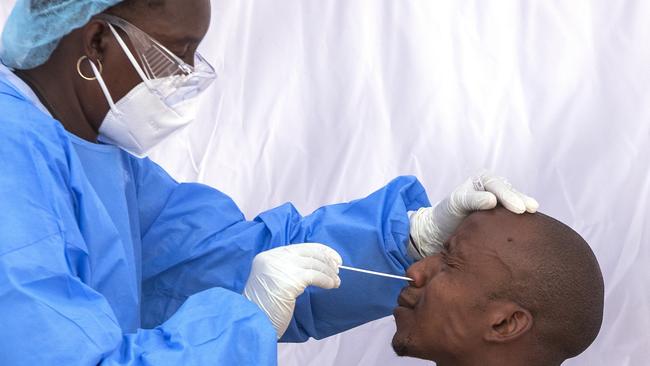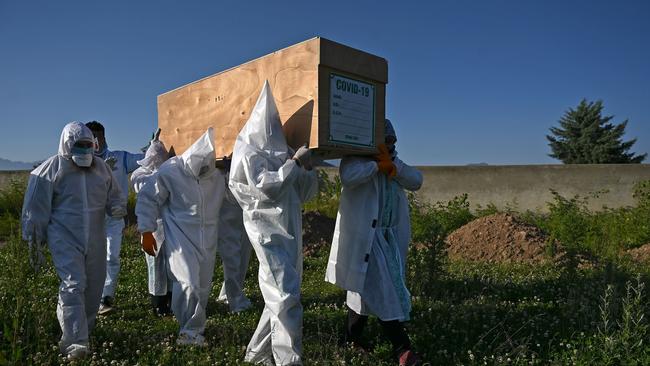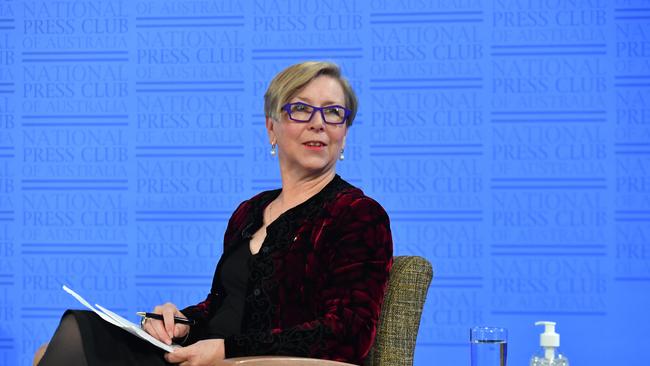Race for coronavirus cure poses a new dilemma
As the world scrambles for a COVID vaccine, there is no room for nationalism.

The bars and restaurants of a pandemic-ravaged western Europe began cautiously reopening this week — just in time for some encouraging news in the race for a COVID-19 vaccine.
However, in large parts of the developing world there has been very little to celebrate as the coronavirus has accelerated through Latin America, Africa, India and Indonesia, culminating on Thursday in the highest, single-day increase in worldwide infections with 106,000 new cases added to the COVID-19 count.
With more than five million people now infected worldwide, and governments across the globe desperate to chart a path back to some version of normality, all eyes are on the race for a COVID-19 vaccine.
As one public health expert wrote recently: “Never before have so many lives, livelihoods, and economies depended so much on a single health intervention.”
Who gets there first however — and how any eventual vaccine is priced and distributed — will determine the manner and speed with which the world recovers.
Just as the pandemic has disproportionately hit poorer communities with less access to healthcare — even within rich countries such as the US — poor and developing nations fear their suffering could be prolonged by unequal access to vaccines and therapeutic drugs.
In the best-case scenario, several vaccines would succeed that could be manufactured quickly. The largest drug manufacturers will agree to produce them at cost and to inoculate first the most vulnerable populations across the world — health workers, the elderly and immune compromised — before distributing subsequent rounds of the vaccine equally across the global north and south.
The worst — apart from no COVID-19 vaccine at all — would see a vaccine-bidding war in which wealthy nations scramble to secure reserves of the first doses and vaccine-manufacturing countries hoard supplies, leaving poor countries to wait out the frenzy and the whole world exposed to fresh outbreaks. It is not as if it hasn’t happened before.

African countries stricken by HIV more than two decades ago were initially priced out of the market for new drugs developed to control the new auto-immune disease.
During the 2009 H1N1 pandemic, rich nations negotiated large advance orders of the vaccine, monopolising initial supplies and forcing poorer countries to wait in line.
It was a year into the 2014 West African Ebola epidemic before a vaccine, under development for more than a decade, was deployed because pharmaceutical companies did not believe they could recoup their costs. By the time it finally was, 11,325 people had died.
“Past experience has taught us that even when tools are available, they have not been available equally to all,” World Health Organisation director-general Tedros Adhanom Ghebreyesus has cautioned. “We cannot allow that to happen.”
Close to 130 companies and research teams are working on vaccines, from the universities of Oxford and Queensland to multinational companies such as GlaxoSmithKline, Sanofi and Johnson & Johnson, and at least 11 have gone to human trials.
Some, but by no means all, have committed to provide any eventual vaccine at cost and to adhere to a global allocation mechanism in which the WHO works out a priority distribution system starting with the world’s most vulnerable.
The WHO and the UN have urged all to consider any eventual vaccine a “global public good” and to waive patents and allow technology transfer so that manufacturers across the globe can produce the vaccine simultaneously.
But no one is underestimating the difficulty of convincing governments of all stripes to put the global good ahead of their own citizens and economies.
Developing nations have already had a glimpse of what so-called “vaccine nationalism” could look like, following the unseemly scrap for limited global supplies of personal protective equipment, COVID-19 test kits and drugs as the pandemic spreads.
Countries such as Indonesia, which were slow to act against the virus and then found themselves bidding against richer nations when they belatedly joined the scramble for supplies, are still trying to catch up.
The Indonesian government has been one of the loudest advocates for equitable access to a vaccine or therapeutic drugs. It has repeatedly expressed concern about how a vaccine might be priced and distributed, and this week pushed hard for commitments on access and technology sharing in the World Health Assembly resolution.
Foreign Minister Retno Marsudi has since intimated Jakarta’s support for the resolution — which included Australia’s call for an assessment of how the pandemic occurred — was contingent on those access clauses.

“Indonesia consistently underlined the importance of this point in the negotiations,” she said on Wednesday. “The vaccine must be accessible and affordable in a timely manner for all countries, especially for developing and least-developed countries.”
President Joko Widodo pushed the same point at a recent meeting of the Non-Aligned Movement, telling the Cold War-era grouping: “We need to fight for just and timely access to affordable COVID-19 medicine and vaccine. Debt relief and debt repayment obligations from official creditors need to be rediverted into financing the handling of COVID-19.”
President Xi Jinping’s WHA pledge to make an eventual Chinese-developed coronavirus vaccine available as a global public good has been widely welcomed, though there are still fears Beijing will preference its allies and client states. China also has committed $US2bn to help developing countries respond and recover from the pandemic.
But efforts by some of the largest economies to reserve advanced supplies of any eventual COVID vaccine is making poorer countries nervous.
Recent comments by the head of French pharmaceutical giant Sanofi that first shipments of any COVID-19 vaccine it produced would go to the US did little to alleviate those anxieties.
“The US government has the right to the largest pre-order because it’s invested in taking the risk,” Sanofi’s Paul Hudson said, provoking outrage in France, where the government also has ploughed millions into the company.
India’s Serum Institute — the world’s biggest vaccine producer and a likely key manufacturer of any eventual COVID-19 vaccine — has hinted it will waive patents should any of its COVID-19 vaccine candidates succeed but also said initial doses would be reserved for Indians.
“I completely understand the domestic pressure governments are under to meet their own needs first but what we really need is for the vulnerable of the world to be vaccinated first, otherwise everyone is going to suffer,” says Jane Halton, a former Australian health department secretary and chair of the Coalition for Epidemic Preparedness Innovations.
“The challenge is making sure we have enough people around the globe prepared to put in for this arrangement, recognising domestic pressure will be extreme. The notion that all vaccine production will go into a global pool may not be realistic, but can we ensure a share of all production from the first dose goes to meet the needs of the vulnerable globally? I’m not confident we will get there but we are having a red-hot go.”
It was the Ebola market failure that led to the creation of CEPI, a non-profit international body that is funding 10 experimental COVID-19 vaccines, including one under development at the University of Queensland.
Together with the WHO, the Gates Foundation and Gavi, the Vaccine Alliance, which subsidises and distributes vaccines across the developing world, CEPI is now leading the charge for a fairer global COVID vaccine distribution system.
The best approach, says Halton, is a transparent worldwide vaccine allocation system in which the WHO determines the global priorities for vaccine allocation based on “how to get the best medical bang for our buck”.
CEPI and Gavi are also working with the heads of the world’s biggest pharmaceutical companies to determine how best to swiftly bring an eventual vaccine to the global population at the scale required.
“One of our strategies is to make sure any eventual vaccine can be manufactured in a number of different sites around the world because that will guarantee greater capacity and greater confidence that the vaccine will be available to people in a number of places based on need,” she says.
China’s pledge this week to make a vaccine available to all was “very welcome” and CEPI was encouraging all countries and companies to commit to doing the same.
Both CEPI and Gavi have worked hard in recent years to make vaccines accessible and affordable to the developing world by raising funds for vaccine research.
Gavi has also used Advanced Market Commitments, in which money is raised and then committed to guarantee the price of vaccines in poor countries. Both say similar arrangements can work for a COVID-19 vaccine also.
This month, the EU spearheaded a global effort that raised $US8bn for research on coronavirus vaccines, treatment and testing. Some money will go to CEPI to support the development of up to three vaccines in the next 18 months, some to Gavi to fund the extraordinary task of quickly distributing a global vaccine during a pandemic.
Washington — which has threatened to permanently cut WHO funding over its handling of the pandemic and its relationship with China — refused to participate, as did Russia. China belatedly pledged $US50m towards the target.
Meanwhile, US President Donald Trump has personally taken charge of his government’s “Operation Warp Speed”, which aims to secure 300 million vaccine doses for the US population by January.
The US administration has singled out 14 vaccine projects and awarded grants of almost $US500m each to Johnson & Johnson and Moderna, a US biotech company that this week said it had produced protective antibodies in a small group of healthy volunteers.
That approach has prompted warnings about “squandering” early doses of vaccine on low-risk people, when inoculating high-risk individuals globally would be more effective.
“Every country will be vulnerable to the spread of the virus if we don’t achieve universal immunisation across the planet,” Ian Frazer, the Australian scientist who developed the HPV vaccine against cervical cancer, told Inquirer.
“It is in everybody’s interests that the vaccination is not just delivered effectively across their own country but globally, otherwise global mobility, global trade will cease. There is not a country in the world that is not vulnerable to the country next door.”
Halton, too, warns vaccine nationalism will backfire “because while one country still has the disease, every country has it. Preferential access provides short-term benefit but very long-term pain.”
Most public health experts agree the best outcome would be if more than one vaccine is developed, though even then a major challenge will be quickly scaling up production to protect eight billion people.
The world does not have the capacity to do that, though companies such as Serum and Johnson & Johnson are building new plants and boosting production scale to try to meet that demand.
There is also a critical global shortage of syringes, needles and glass vials to urgently address to deliver the vaccine.
Frazer says countries that manufacture the vaccine inevitably will have first dibs for their population, and that may not include Australia (unless the UQ project succeeds).
“If a COVID vaccine came about tonight we would not have the capacity to manufacture enough vaccines to immunise Australia,” Frazer says.
“Australia would have to rely on the generosity of those countries that have manufacturing capacity, or get on and build it here.”
Every country faces the same dilemma if their research does not succeed, or their manufacturers are incapable of producing the eventual vaccine.
At a time when the temptation to look after our own first has scarcely been greater, the need for co-operation has never been more urgent.


To join the conversation, please log in. Don't have an account? Register
Join the conversation, you are commenting as Logout